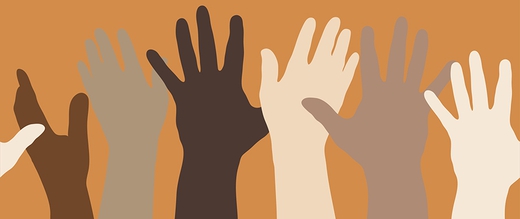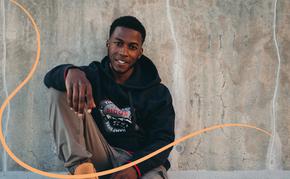The views expressed in our content reflect individual perspectives and do not represent the authoritative views of the Baha'i Faith.
After burglars stole my stuff and trashed my house; after I caught two of them; after I saw a frightened, sick teenage girl take the fall for the crime; after I determined I had to do something about such a gross injustice and so many like it; I remembered this simple but profound wisdom in the Baha’i writings:
O ye friends of God! Today is the day of union and this age is the age of harmony in the world of existence. “Verily, God loveth those who are working in His path in groups, for they are a solid foundation.” Consider ye that he says “in groups,” united and bound together, supporting one another. “To work,” mentioned in this holy verse, does not mean, in this greatest age, to perform it with swords, spears, shafts and arrows, but rather with sincere intentions, good designs, useful advices, divine moralities, beautiful actions, spiritual qualities, educating the public, guiding the souls of mankind, diffusing spiritual fragrances, explaining divine illustrations, showing convincing proofs and doing charitable deeds. – Abdu’l-Baha, Baha’i World Faith, p. 401.
The passage gave me and idea, so I called my good friend Larry, the best and most effective attorney and activist I know, and we sat down at lunch to see if we could figure out a way to assemble some talented and committed people to help. Larry worked for labor leader Cesar Chavez for many years, led a campaign called Jobs with Peace and has a long history of advocacy for the poor and the oppressed.
Larry said “Let’s get a little rump group together on the issue.”
I had to look that one up. Rump doesn’t just mean hindquarters—it also means a “group put together without official or formal appointment or election.”
So we appointed ourselves. Well, mostly Larry did. He knew several people who served as court system advocates, public defenders, judges and legislators; and I knew people from the substance abuse treatment and the health care communities. We asked a bunch of them to come to a meeting. We laid out the problem and maybe a dozen selfless people agreed to volunteer and get involved, on their own time, for no pay. A little rump group with sincere intentions soon coalesced, and we went to work.
It took several months, but by the end of that time we had compiled a thick reference file on the issue. We knew more collectively than any of us did individually, and together we gradually formed an ad hoc, unofficial but fairly knowledgeable core of advocates for substance abuse-related reform of the justice system. We had no money and no power, but we had youth, enthusiasm and naïveté on our side.
Here’s what we concluded after we finished our research: if the courts diverted all of the tens of thousands of nonviolent first offenders, almost all of them simple drug possession cases, into drug and alcoholism treatment programs, we could treat the disease of addiction rather than punish it, effectively prevent future crimes, and oh, by the way, save the state and its taxpayers a billion dollars. Literally. Excited, we wrote a legislative bill that would implement the policy changes we wanted to see, and began talking to elected state officials to see if we could find someone who would sponsor the bill.
 That failed miserably. Every elected leader we spoke to said no, or even “NO!,” afraid of being labeled by their political opponents as “soft on drugs.” Several privately acknowledged the scope of the problem and said they liked our proposed solution, but refused to help. Most wouldn’t even return our calls. Now what?
That failed miserably. Every elected leader we spoke to said no, or even “NO!,” afraid of being labeled by their political opponents as “soft on drugs.” Several privately acknowledged the scope of the problem and said they liked our proposed solution, but refused to help. Most wouldn’t even return our calls. Now what?
Finally, months later, after talking to everyone we knew and starting to despair of ever finding a solution, our friend Bill, who ran a campaign firm that specialized in progressive new movements, had a terrific suggestion. “If all else fails,” he said, “put it on the ballot.”
In California, as in many other states and nations, non-partisan ballot measures called initiatives can, if they pass, actually make laws the legislature can’t or won’t create. They’re expensive—typically at least a few million dollars to start and run—and they’re risky, because they depend entirely on the voters; and even more importantly on who decides to oppose your efforts with big media buys. But some of us had experience with non-partisan initiative campaigns, so we decided to give it a try.
Over the next year Bill and his firm took over and did the real work, raising the necessary funds from a few very wealthy and very committed advocates for our cause. They hired a young staff, did more research and built the campaign. It had two goals: educate the public about how drug diversion could benefit everyone; and try not to antagonize any group into formally opposing and spending big dollars to defeat us. After gathering enough voter signatures on petitions we officially qualified, got our ballot number—Proposition 36—and our name—The California Substance Abuse and Crime Prevention Act. A large group of very committed people began to campaign like mad. As a truly grassroots effort, the campaign ran on a shoestring. As serious underdogs, no politician endorsed the initiative. One powerful group—the prison guards union—formally opposed us, and started spending money to defeat us. The pundits gave us zero chance to win. Even the odds-makers in Vegas said we had no hope.
But on Election Day, sixty percent of the voters in the state said yes to the California Substance Abuse and Crime Prevention Act, and thirty-nine percent voted no. We won.
Later, many other states would adopt Proposition 36-style laws.
On election day, and at our campaign’s victory party that night, despite our elation, I couldn’t get the bruised, defeated face of that teenage girl out of my mind. I could still see her in that courtroom, and hear her father’s grief. She and her friends had stolen my possessions and inadvertently given me, and millions of others, a great gift. I wondered where she was, and how she was doing, and whether she even knew about the movement her suffering had helped start.
You May Also Like
Comments

















On a somewhat related topic, I'd like to get a "rump" together to take ...on the issue of the length of time it takes to bring a capital murder case to trial. My family (what's left of it) is waiting for the trial of a murderer, whose accomplice said they were high on meth, to begin. It's been 2.5 years since he killed my brother early one morning as he slept and a retired couple the same way four days later, and the trial was recently postponed for a 4th competency hearing (all because the defendant refuses to participate) and has been scheduled for Feb. 2, 2015, which will be over 3 years. If you know anyone interested in taking on that corner of justice, for the victim's families, I'd like to meet them.